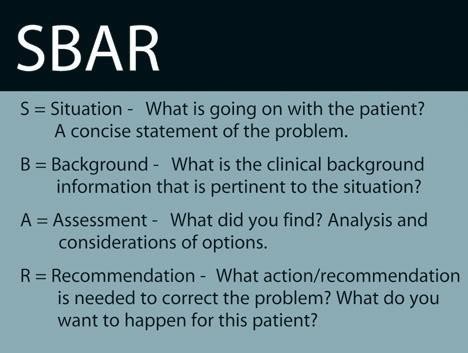A male client who fell at home and experienced a brief loss of consciousness becomes increasingly confused after admission to the medical unit. The family requests an update on the client's condition. Using the SBAR (Situation, Background, Assessment, Recommendation) communication, which information should the nurse provide first?
Increasing confusion of the client.
Client's healthcare power of attorney.
Currently prescribed medications.
Fall at home as reason for admission.
The Correct Answer is A
Choice A Reason: This is the best action because it describes the current situation of the client and alerts the family to a possible change in the client's status. The nurse should provide the most relevant and urgent information first using the SBAR communication.
Choice B Reason: This is not the first action because it does not address the current situation of the client. The nurse should verify the client's healthcare power of attorney, but this is not a priority at this time.
Choice C Reason: This is not the first action because it does not explain the cause of the client's confusion. The nurse should review the client's medications and assess for any adverse effects, but this is not a priority at this time.
Choice D Reason: This is not the first action because it provides background information that is not directly related to the current situation of the client. The nurse should give a brief history of the client's admission, but this can be done later.

Nursing Test Bank
Naxlex Comprehensive Predictor Exams
Related Questions
Correct Answer is D
Explanation
Choice A Reason: This assignment does not require immediate follow-up action by the charge nurse because a practical nurse can transport a stable postoperative client to another unit and report any changes or concerns to the primary nurse.
Choice B Reason: This assignment does not require immediate follow-up action by the charge nurse because a practical nurse can monitor the blood pressure of a client with hypertension and administer antihypertensive medications as prescribed and delegated by the primary nurse.
Choice C Reason: This assignment does not require immediate follow-up action by the charge nurse because a graduate nurse can obtain a unit of packed red blood cells from the blood bank and verify the compatibility and identification with another registered nurse before transfusing it to the client.
Choice D Reason: This is the correct answer because checking a client for fecal impaction is beyond the scope of practice of unlicensed assistive personnel. It involves inserting a finger into the rectum and assessing for hard stool, which can cause injury or infection to the client. The charge nurse should intervene and assign this task to a registered nurse or a practical nurse.
Correct Answer is A
Explanation
Choice A Reason: This is the best action because it describes the current situation of the client and alerts the family to a possible change in the client's status. The nurse should provide the most relevant and urgent information first using the SBAR communication.
Choice B Reason: This is not the first action because it does not address the current situation of the client. The nurse should verify the client's healthcare power of attorney, but this is not a priority at this time.
Choice C Reason: This is not the first action because it does not explain the cause of the client's confusion. The nurse should review the client's medications and assess for any adverse effects, but this is not a priority at this time.
Choice D Reason: This is not the first action because it provides background information that is not directly related to the current situation of the client. The nurse should give a brief history of the client's admission, but this can be done later.

Whether you are a student looking to ace your exams or a practicing nurse seeking to enhance your expertise , our nursing education contents will empower you with the confidence and competence to make a difference in the lives of patients and become a respected leader in the healthcare field.
Visit Naxlex, invest in your future and unlock endless possibilities with our unparalleled nursing education contents today
Report Wrong Answer on the Current Question
Do you disagree with the answer? If yes, what is your expected answer? Explain.
Kindly be descriptive with the issue you are facing.
